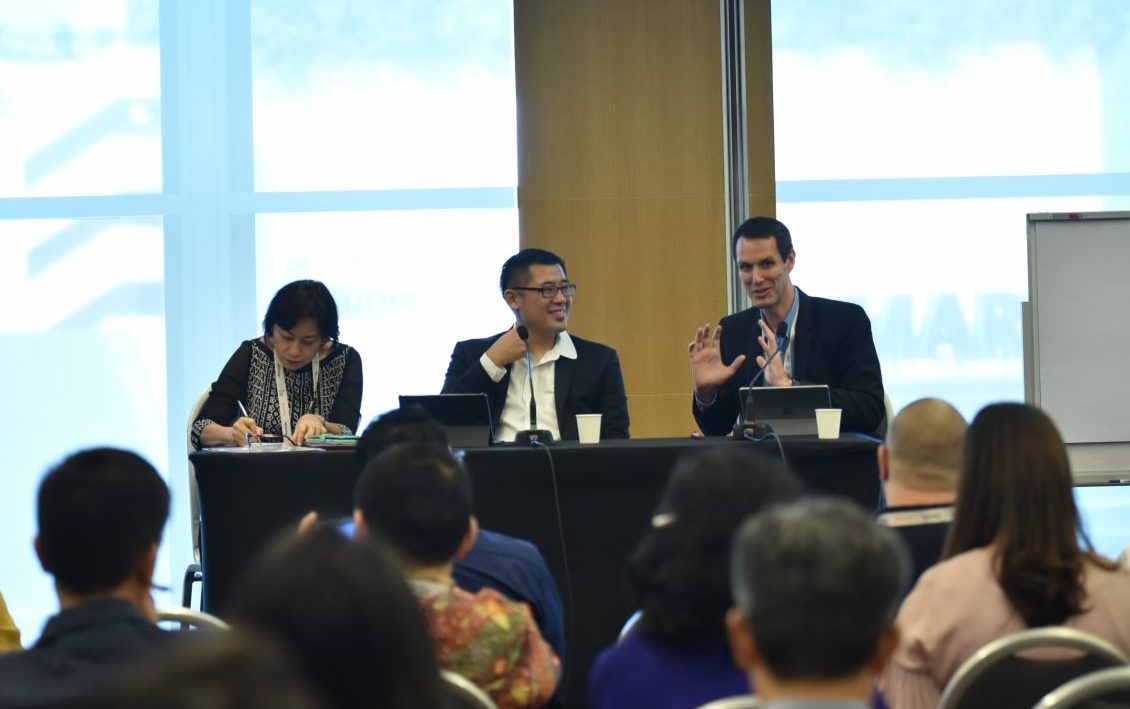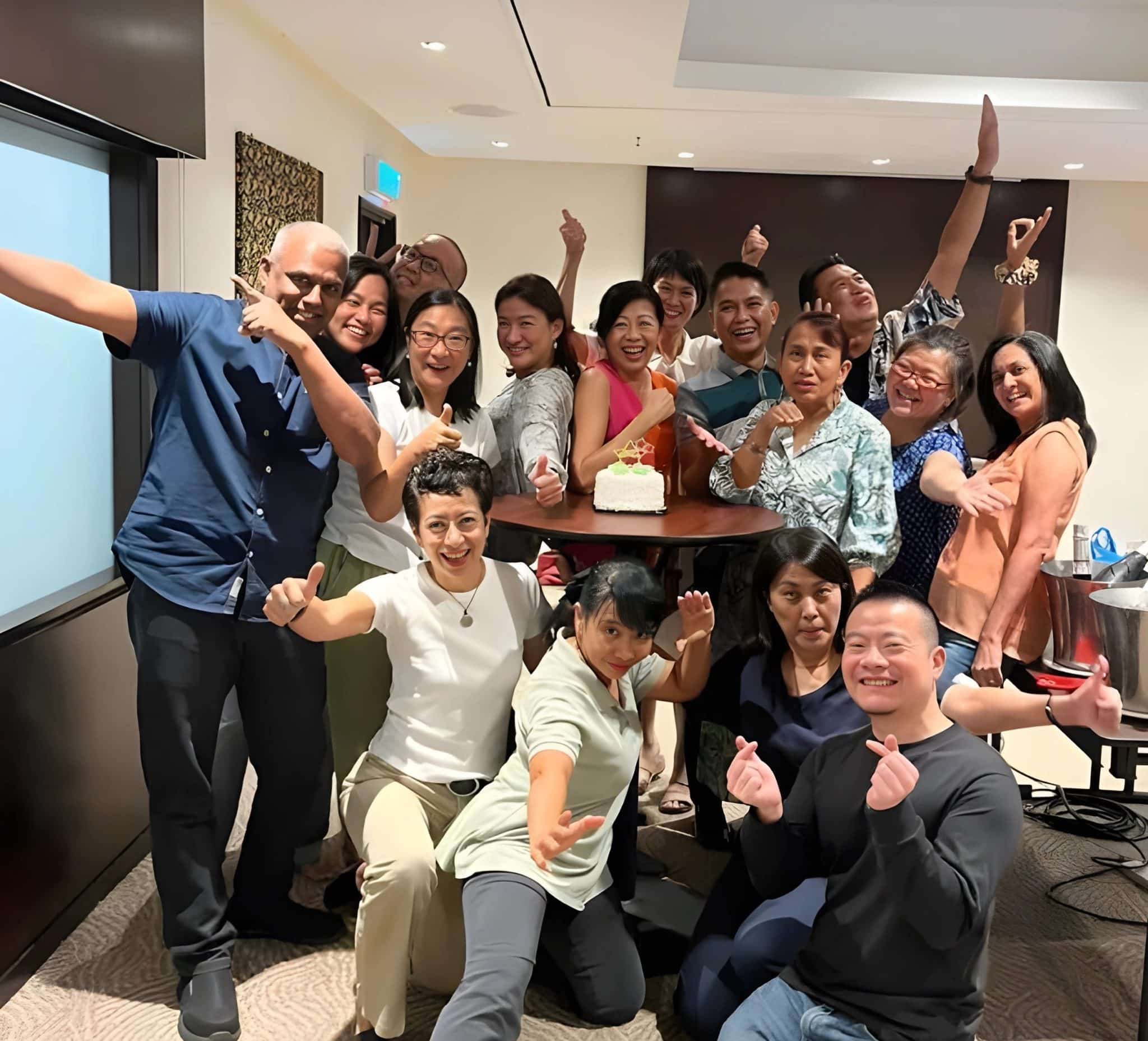
At the heart of a purposeful business is a heart for people, stressed both Mark Tovell and David Tjokrorahardjo in a masterclass on Sustaining Business with Purpose. Photo from www.telunasresorts.com.
When guests step into Telunas Resorts, which is nestled on two beaches in the Riau Islands, the first thing many notice is that there is no WiFi.
This is not because the five-star-rated (according to TripAdvisor) beach resort, located just 50km south of Singapore, is too remote. Neither was it a gross oversight by the resort’s management.

David Tjokrorahardjo (middle) from Sovereign’s Capital and Mark Tovell (right) from Telunas Resort at the masterclass on the second day of the Eagles Leadership Conference at Suntec Convention Centre. Photo courtesy of Eagles Communications.
Rather, it was a strategic decision aimed at inviting guests to step away from their phones and reconnect with what matters in their lives, be it their families, faiths or life’s purpose, said co-partner of Telunas Resorts, Mark Tovell.
But not just that.
“We invite them to detox and step away, and then we invite them to think beyond themselves,” said Tovell, who was speaking at a masterclass on sustaining business with purpose at the Eagles Leadership Conference 2019 last week (July 26).
“A purposeful business is about being a force for good, a force for change, a force for transformation.”
While most guests arrive on the islands for a relaxing getaway, some end up participating in a variety of community projects that the resort invites them to take part in, such as building roads, teaching English in villages, releasing turtles into the wild and planting mangroves.
This is part of Telunas Resort’s vision of transforming culture, as opposed to merely leveraging it for profit, said Tovell, who is also the director of strategic leadership at Indonesian consultancy BME Services.
Striving to transform culture for the better is one of the hallmarks of a purposeful business, he said. It is not only about identifying what the market needs and will pay for, but also about being “a force for good, a force for change, a force for transformation”.
People before profit
Ultimately, at the heart of a purposeful business is a heart for people, stressed both Tovell and David Tjokrorahardjo, a partner at Sovereign’s Capital, a US-based equity that invests globally, who was sharing the panel with Tovell.
“Business with a purpose must first begin with the idea that it is people over profit. It’s not (the mindset of): Let’s make tons and tons and tons of profit, and then let’s start to think about the people around us,” said Tjokrorahardjo.
“As a matter of fact, if you build (up) your people, if you’ve benefited the people around you with that purpose, then profit will come by itself,” he said, adding that the people a business has the power to benefit are its customers, employees and the community it is located within.
“Business with a purpose must first begin with the idea that it is people over profit.”
He urged business owners and leaders to serve their customers with excellence, genuinely looking to their interests.
Additionally, instead of exploiting employees and the community for profit, a purposeful business should strive to build up its staff and bless its community.
“In our era today, if (our employees) are not growing, we are actually enslaving them for us … We say that you work for me and you will do whatever I say you’re going to do,” said Tjokrorahardjo.
“But they’re not growing. Maybe we (as managers) are growing, maybe we are fulfilling our purpose, but my question is: Is your business purposefully growing the people that are inside your company?”
Tjokrorahardjo also highlighted Telunas Resort as an example of being a blessing to the community it’s located in.
Said Tovell, whose 150-strong team is mostly made out of local villagers: “At Telunas, our focus is on blessing the local community … It has been a task to invest in them and bless them, because their mindset is very different than the hospitality and business mindset. But we put a lot of energy into this because we want to bless them (with employment) rather than try to bring in (foreign) people.”
Apart from hiring locals, the resort also helps to support local entrepreneurs, improve waste management and conserve the environment, added Tovell.
Establishing a purpose-driven culture
Creating a purposeful business cannot fall on the shoulders of one or two people in the organisation, it has to be a collective effort by all employees who share the same mindset.
“Culture can be like a river. If it’s headed in the right direction, it can move you forward so much. If it’s headed in a different direction, you’re fighting it the whole time,” said Tovell.
The culture at Telunas Resorts is summarised into 3Hs: Be humble, stay hungry and show heart, he said, adding that how well a person embodies these traits affects whether they are recruited or promoted.
“Culture can be like a river. If it’s headed in the right direction, it can move you forward so much.”
It is also important to align systems and practices to that culture and highlight and affirm instances in which behaviour in line with the culture was appropriately shown, he said.
Ultimately, the key culture drivers have to be those in top leadership positions, and it is important that they walk the talk.
“For exploitative businesses, at the leadership level … we’re looking out for ourselves. That’s a win-lose mindset. I win, you lose. At an ethical business, it goes beyond that; it’s saying: I win, you don’t lose.
“But a purposeful business is taking a step further and saying: I’m willing to sacrifice. It’s a death to self, an immediate inspiration from Jesus’ message in the Bible … and at the leadership level it’s death to self by saying, I sacrifice and we win together.”
We are an independent, non-profit organisation that relies on the generosity of our readers, such as yourself, to continue serving the kingdom. Every dollar donated goes directly back into our editorial coverage.
Would you consider partnering with us in our kingdom work by supporting us financially, either as a one-off donation, or a recurring pledge?
Support Salt&Light



